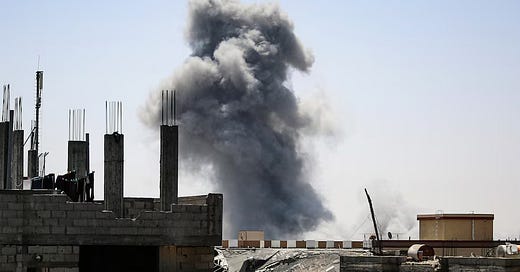Israel Evaluates Rafah Strategy Following Biden's Arms Embargo Threat
Biden's Stern Warning to Israel: An Analysis of Political Implications and Regional Impact.
Backdrop of the Tensions—watershed moment
Recent months have been tense between the United States and Israel as their disagreement over the conduct of the ongoing conflict in Gaza deepens. The latest flashpoint is President Joe Biden’s unprecedented warning to Prime Minister Benjamin Netanyahu that the U.S. would cut off offensive weapons shipments if the Israeli military advances into Rafah, a densely populated city in southern Gaza harbouring over one million Palestinians. This marks a significant rupture in diplomatic relations and signals a stern shift in the U.S. policy regarding its unwavering support for Israel.
Caught Off Guard: Israel’s Predicament
This unexpected policy shift left Israel contemplating the next steps in its war strategy. Former National Security Adviser to Netanyahu, Yaakov Amidror, acknowledged the impact of Biden’s warning, compelling the Israeli war cabinet to reconsider its planned incursion into Rafah. The core decision now revolves around whether Israel can continue without American support or if halting operations would leave Hamas intact.
Responses to Biden’s Threat
Israel’s response to Biden’s threat varied, reflecting both defiance and frustration. While some members of Netanyahu's ruling coalition insist that Israel would achieve complete victory despite U.S. pushback, others, like Israeli Foreign Minister Israel Katz, view Biden's policy change as a threat to the objective of dismantling Hamas. These reactions highlight the challenge Israel faces in balancing its security goals with the risk of losing crucial military support.
Shifting Dynamics in Negotiations
Ceasefire talks between Israel and Hamas in Cairo teeter on the brink of collapse amid these heightened tensions. Hamas, now returning to Doha after recent negotiation setbacks, remains committed to its proposed ceasefire. However, Israel contends that Hamas's outline diverges from the one currently on the table. With both sides unable to reach a consensus, Biden's stern warning further complicates the prospect of a diplomatic resolution.
Humanitarian Crisis and the Role of Aid Agencies
The Israeli incursion into Rafah has created a humanitarian crisis, with the two main border crossings into southern Gaza shut down, and the flow of aid severely restricted. This has led to shortages of critical supplies, especially in northern Gaza, where the World Food Programme warns of an emerging famine. The Biden administration's emphasis on protecting civilian lives and enabling humanitarian aid access remains at odds with the current offensive strategy.
Lack of Long-Term Strategy
A major source of U.S. concern is the absence of a comprehensive plan to ensure the long-term governance and rebuilding of Gaza post-conflict. Despite discussions between Israel, U.S. officials, and international aid organizations, no satisfactory plan has been formulated to relocate civilians or rebuild infrastructure in Gaza. This lack of foresight is fueling diplomatic tensions.
Conclusion: Navigating Uncertainty
In this challenging landscape, Biden’s warning underscores a profound shift that could redefine U.S.-Israel relations. The warning is driven partly by domestic politics but also reflects international concerns about civilian protection and the long-term stability of the region. While the path forward is uncertain, cautious optimism remains that a solution will emerge which respects civilian lives while addressing Israel’s security needs. The hope is for renewed diplomacy that could steer the conflict towards a sustainable resolution.






